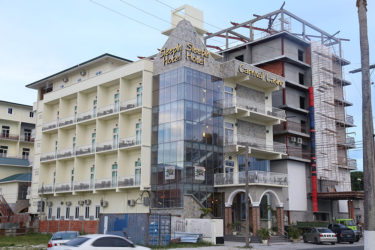The Gaming Authority yesterday said that it denied the applications of SleepIn International Hotel and Casino Inc for casino licences because it failed to provide proof of “its financial soundness and capability,” which was critical for approval.
In response, hotel owner Clifton Bacchus yesterday said that he would reapply and provide the necessary documentation.
“It is nothing hard for me to correct but it is very costly,” Bacchus told Stabroek News yesterday, when contacted.
Last Saturday, Stabroek News reported that the authority had denied the casino licence application.
Bacchus had previously said he was ready to create 300 jobs at the Church Street, Georgetown hotel and casino, despite attacks by competitors and others about the suitability of the hospitality and gambling outfit.

Yesterday, he said he had filled out the application and was under the impression that he had fulfilled the criteria, including paying the $9 million fee. “I did not put enough assets. I have the assets but I did not put it in. I myself overlooked it and I am about to correct it,” he added.
According to a press release issued yesterday by the Authority, which is chaired by attorney Roysdale Forde, it had received the application on August 2, 2016 for the granting of a casino operator’s licence and a casino premises licence.
“The Authority wishes to state that having received and thoroughly considered the application it unanimously found no evidence upon which it could arrive at a determination that SleepIn International Hotel & Casino Inc qualifies for the issuance of the licences applied for, having regard to its failure to provide the Authority with documents evidencing its financial soundness and capability, one of the critical criteria for granting of such licences,” it said.
It indicated that the omission was considered a “grave defect” in the applications, which necessitated a refusal since the regulations in Section 29 (a) (1) (c) of the Gambling Prevention Act speak clearly and specifically to “financial soundness and financial capability of the applicant.”
The hotel, in its own press release yesterday, said that it was informed that its applications were refused on the ground “that sufficient financial information was not submitted with the application.
“The company is currently in the process of accumulating this information and will be submitting new applications along with this information in due course,” it added.
The Gambling Prevention Act allows for the creation of casino premises and the issuance of a casino operator’s licence but it makes clear that “no more than three casino premises licences” may be issued in respect of any one of the country’s ten regions and limits the issuance of such licences to new hotel or resort complexes that have “a minimum of one hundred and fifty rooms allocated for accommodation.”
Under Section 30 of the Act, the legislation also stipulates that gambling in a licensed casino is limited to “a paying guest accommodated in a room of the hotel of resort complex in respect of which the casino premises licence was issued or any other person or class of persons authorised by the regulations.” Under Section 31, persons contravening the regulations “commit an offence and are liable on summary conviction to a fine of not less than one million dollars and not more than twenty million dollars and imprisonment for a term of not less than six months nor more than two years.”
Bacchus had previously told Stabroek News that he is in possession of a Memorandum of Understanding (MoU) between himself and the Government of Guyana, signed under the Donald Ramotar administration in 2014. This MoU guarantees him a licence to operate a casino once he is able to complete construction in line with several specifications.
Persons living in Church Street near the proposed casino had voiced objections to its establishment in the residential area, where both a church and a mosque are located nearby.








